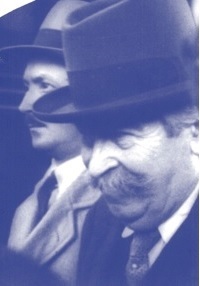New York, Saturday 28 March 1942
Hommage international à Aristide Briand
Université de New York, Saturday 28 March 1942
Speech Alexis Leger
This is the only Alexis Leger has delivered speeches in public in the United States. He reproduced the entire text in Honor of Saint-John Perse in 1964 (p. 716) then in his Pléiade (p. 605).
The Foundation owns the manuscript (17 very overloaded sheets). The poet gave references of its first publication, USA, en français, in 1943 (he himself donated the thin brochure at the National Library), it is more allusive as to its first publication, English, by the University of New York, from 1942. Is that the text will neighbored with other speakers, like it, had participated in the event.
These other speakers, there is no mention, nor does it specify that the event was organized by Coudenhove Kalergi. It suggests the contrary have been at the center of public interest. President Roosevelt would personally involved in the publication of the text in French. In a letter to his friend Lilita Abreu, few days before the event (15 March), Alexis Leger is proud to speak first, have got to speak French, and twice as long as the other.
The announcement of the event and its reporting in the press, e.g. New York Times can correct the perspective. The same brochure Addresses in commemoration of the eighteenth anniversary of the birth of Aristide Briand, which reproduces the transcript of all interventions.
Denis de Rougemont was in the room. He listened to the speech “from one end to the other with a strong emotion” and that “from the attack of the second sentence, What was this man […], final blow to the bow of the peroration”. Speaking ? Alexis Leger ? Saint-John Perse ? “In the hall resounded great musical prose, and is not unworthy of the poet’Exile et d’Anabasis”.
The emotion and strength of all that united Alexis Leger Briand explains the use, absolutely outstanding home, First Person, and the confession of his emotion :
J’ai accompagné Aristide Briand à Washington, London, at Locarno, Brussels, à La Haye, à Madrid, à Berlin… […]
The agony of Briand !… Who could fathom the depths of this tragedy ? I have known that the reflections, in this small room where we were three to ensure. […]
The next, I was in my office at the Quai d'Orsay. A distant voice had managed to force the set my switchboard : it was an old sailor on the Normandy coast with whom I got along for guarding small sailboat Briand. “Mr., said the voice, does he put the flag at half mast ?”. The emotion suspended my answer…
The most important passage for the author, in that its own destiny in the eyes of history is inextricably linked to that of Briand, is probably the one where he evokes the instrumentalisation, by the Vichy Regime, Briand's dream of a Franco-German reconciliation and a united Europe, caricatured in a new order in Europe amid Collaboration :
Those who, en France, who most violently fought offers collaboration made, establish peace, in full agreement with the European Community, by a strong and victorious France to Germany and Republican disarmed, are the same that were one day to find acceptable offers collaboration made, on a war footing, in favor of a German order, by a totalitarian Germany, imperialist and racist slave to France, oppressed and isolated.


